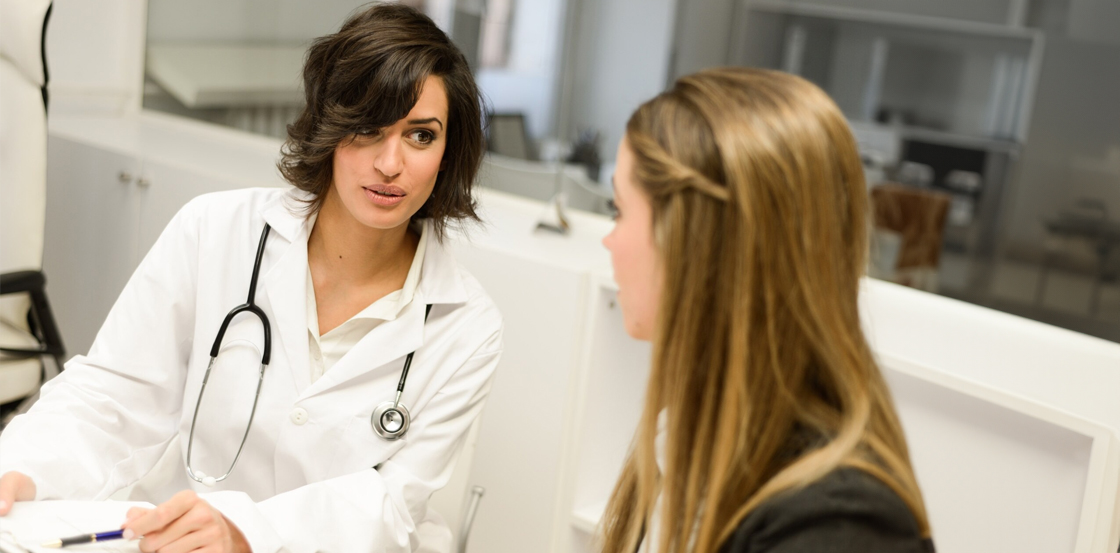Post link copied to clipboard!

Fibroids, uterine myomas or leiomyomas, are non-cancerous growths formed in or around the womb, composed of muscle and tissue. Most women with fibroids are unaware of their presence, as symptoms are experienced by only about one in three individuals.
In many instances, fibroids are discovered during routine gynaecological exams or scans. Common fibroid symptoms encompass heavy or painful periods, abdominal discomfort, lower back pain, increased frequency of urination, constipation and pain during sexual intercourse.
You should consider treatment if your fibroids are causing noticeable symptoms or daily discomfort or if they are affecting your fertility. For most people, fibroids and their associated symptoms are usually mild, and they will naturally shrink without treatment after menopause. It happens because fibroids begin to reduce in size as your body’s oestrogen levels decrease.
It’s important to note that each type of fibroid may require a different approach to treatment. The treatment choice depends on:
Your best private gynaecologist in London will discuss your options and recommend the most suitable treatment plan.
Uterine fibroids, little growths in the womb, have a mysterious origin. Many health experts, like gynaecologists, think these fibroids relate to higher oestrogen levels, the hormone responsible for female traits. It might be why it is common for women during their baby-making years to seek treatment for fibroids. Some studies suggest that growth factors such as genetic changes and shifts in hormone levels, like oestrogen and progesterone, might encourage the womb’s lining to grow each menstrual cycle. But the exact cause remains a bit of a puzzle.
Certain things can catalyse the chances of getting fibroids. For instance, having low levels of vitamin D, starting your period at a young age, and having family members with fibroids can raise the risk.
In short, while the exact reason why fibroids form is not fully understood, some things, like hormonal changes and family history, might play a role in their development.
In the United Kingdom, various medications can aid in fibroids management. While it’s important to note that these medications won’t eliminate fibroids, they can potentially reduce their size or slow their growth rate. They achieve this by influencing the hormones that regulate the menstrual cycle. It’s worth mentioning that medicine may be less effective for larger fibroids.
The LNG-IUS is a small, T-shaped plastic device that is delicately inserted into the womb. Over time, it steadily releases a hormone called levonorgestrel, which works to prevent the uterine lining from growing too rapidly. It leads to a thinner uterine lining and significantly lighter menstrual bleeding.
Gn-RH agonists, on the other hand, function by blocking the production of oestrogen and progesterone, inducing an artificial and temporary state of menopause. This cessation of menstruation can cause fibroids to shrink. Occasionally, private gynaecologists in London prescribe a Gn-RH agonist to reduce the size of a woman’s fibroids before planned surgery. However, it’s important to note that this treatment is short-term. There are various side effects associated with this approach, which may include:
To alleviate these side effects, gynaecologists may recommend a combination of Gn-RH agonists and a low dose of hormone replacement therapy (HRT). It’s essential to keep in mind that once you discontinue treatment, fibroids may start to grow again, and symptoms can gradually return.
Contraception methods like the contraceptive pill and the intra-uterine system (Mirena coil) can ease your symptoms caused by fibroids. The contraceptive pill not only makes bleeding lighter but can also lessen menstrual pain. Meanwhile, the Mirena coil, a progesterone-releasing device placed inside the womb, is effective in reducing heavy bleeding caused by fibroids. Although these methods can improve symptoms, it’s important to note that they won’t shrink the size of the fibroids.
While fibroid treatments in the UK usually effectively manage the issue and provide relief from fibroid symptoms, they often do not make fibroids completely disappear. Instead, they typically cause fibroids to shrink. In some instances, fibroids may regrow and lead to recurring symptoms that require additional care.
The only treatment option that guarantees the permanent removal of fibroids with no risk of recurrence is a hysterectomy, which involves the complete removal of the uterus. However, this particular type of private fibroid treatment should be considered a last resort and may not be suitable for most fibroid patients. If you’re seeking fibroid treatment in the UK, book your appointment with Top Gynaecologists London today!
Did you know that more than 6 out of 10 women may experience fibroids at some point in their lives? At Top Gynaecologists Clinic, experts take a comprehensive approach to help treat fibroids with innovative and unique methods. Their specialists help women who are trying to conceive or planning for the future. Their treatments have a strong track record of significantly improving fertility.
Mr Mahantesh Karoshi is a Consultant Gynaecologist expert in treating fibroids. He specialises in minimally invasive surgery, aiming to reduce symptoms and promote quick recovery. Their focus is on customising treatments for each individual. If one treatment doesn’t work, Mr Karoshi is dedicated to finding an alternative solution.